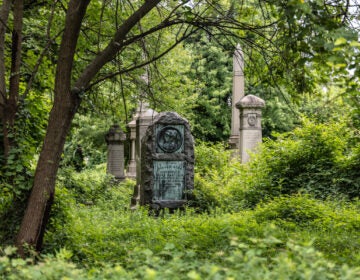Planning Commission OKs Foxwoods’ plan
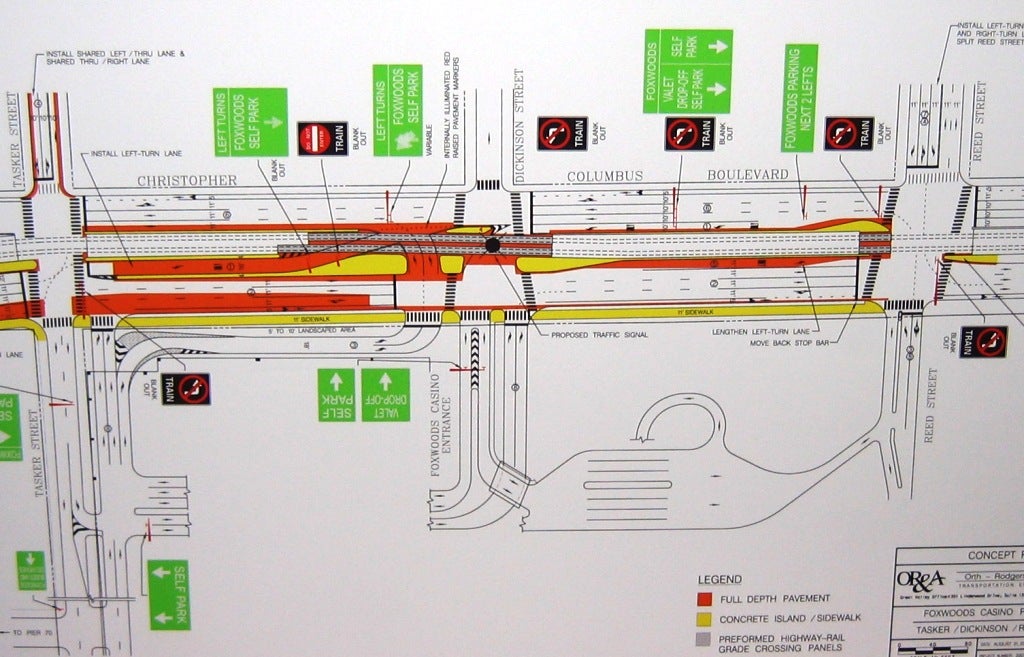
Foxwoods’ new traffic schematic
By Matt Blanchard
For PlanPhilly
The Philadelphia City Planning Commission gave its unanimous support to Foxwoods’ $560 million casino project on Tuesday, despite startling new numbers on the most contentious issue facing the plan: Traffic.
Foxwoods traffic consultants conceded the casino is likely to double daily traffic volume on South Columbus Boulevard, adding between 20,000 and 30,000 vehicles to an already overtaxed road.
Foxwoods also detailed its plan to fix the problem, a complex strategy of light timing and physical improvements to nine intersections.
Those assurances were apparently enough for the Planning Commission, which had postponed the decision at its July 17 hearing. This time, the six present members all voted to approve new Commercial Entertainment District zoning for the casino, as well as the casino’s development plan and design. The vote clears the way for Foxwoods to press its case in City Council.
While some in the crowd chanted “shame, shame,” commission members said they were making the best of a situation imposed by the state.
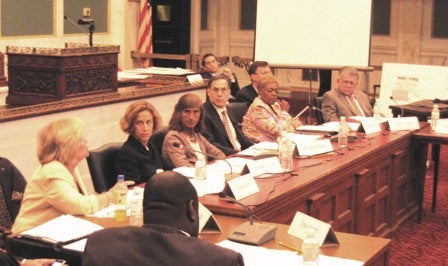
“We all understand there are problems,” said planning commission member Gloria Levin. “We’ve tried our best to regulate [the casino design] as best we can within our limited purview.”
When City Council reconvenes in September, Foxwoods executives hope to secure approval and begin construction of the facility by October. For a bill to pass, however, a member of council must introduce it. The next question for Foxwoods, then, is which council member will step forward to do it.
“We’re still trying to find that magical person,” said Foxwoods attorney Jeffery Rotwitt.
Foxwoods, best known for their mega-casino in Connecticut, proposes a 3.7 million-square-foot facility along the river at Columbus Boulevard between Reed and Tasker Streets. The first phase includes 3,000 slot machines. Later phases will add shops, restaurants, entertainment venues, a parking garage, a public riverfront walkway and possibly two condominium or hotel towers.
Tuesday’s meeting was a continuation of the hot-blooded July 17th session, where the commission faced hours of angry testimony against Foxwoods inside the Philadelphia Free Library auditorium. For Tuesday, the venue had changed to City Hall’s Room 400, with half-a-dozen police officers from the Civil Affairs unit stationed by the doors and at the back of the room.
“We’ve asked Civil Affairs to remove anyone who is disruptive,” announced commission chair Marcia Moore Makadon.
Two issues dominated the discussion: traffic and riparian rights.
Traffic yes, but when?
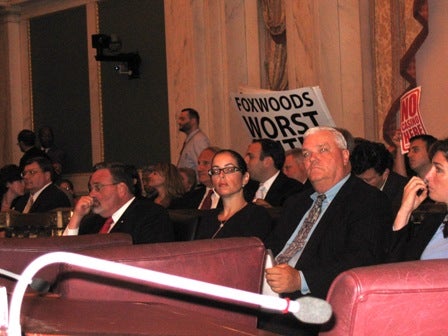
Fresh from a press conference in which he announced a new anti-Foxwoods effort in Harrisburg, State Rep. Bill Keller aimed his big voice squarely at the traffic question.
“My office is a block away from the Foxwoods site,” Keller bellowed. “Any traffic engineer that tells me fixing the lights is going to alleviate the problem, I think they should turn in their traffic engineering degree.”
But Foxwoods traffic consultant Jeff Greene, of Orth-Rogers Associates, argued the big numbers on traffic are not as bad as they seem.
While the casino will attract 30,000 new vehicles per day,
Greene argues the breakdown that matters is not daily, but hourly.
Peak traffic for the casino will occur at 10 p.m., Greene said, a time when traffic generated by neighboring uses, such as Wal-Mart, is at a low point.
That means the casinos will be adding volume during times that are not now peak hours, Greene said. Imagining the hourly traffic rates as a landscape, casino traffic will be dumped in the valleys, not on the peaks.
“The daily traffic number is just a number,” Greene said. “You’ve got to break it down by hour.”
Foxwoods’ Traffic Plan
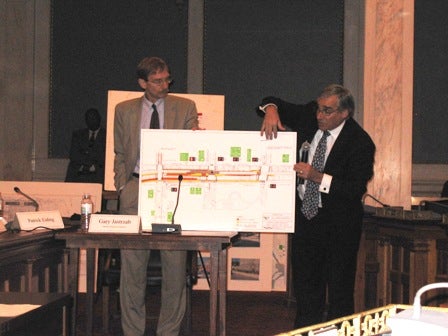
According to testimony, Foxwoods’ plan for Columbus Boulevard has received the endorsement of both PennDot and the City Streets Department.
The scheme involves installing double left-hand-turn lanes off Columbus Boulevard onto Interstate 95 near Market Street, as well as onto Washington Avenue. The casino property will have entrances at Dickenson and at Reed streets. On the casino site, a complex weave of traffic lanes will distribute exiting cars smoothly onto north and southbound lanes. Several nearby streets perpendicular to Columbus Boulevard will be widened.
The plan also involves the stoplight timing ridiculed by Keller.
From Market Street to the Ikea shopping complex, the city is retiming certain light cycles along Columbus Boulevard from 90 seconds to 120 seconds, with more time for pedestrians to cross.
“When we retime the signals, [traffic] should move at an easier clip,” said Charles Demming of the City Streets Department. “We’re not necessarily increasing the speed of traffic, but you’ll be able to move more smoothly through Columbus Boulevard.”
Impact of two casinos questioned
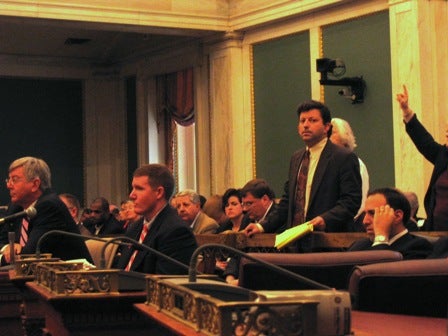
While the commission says it does not submit to direct questioning from the audience, anti-casino attorney Paul Boni shaped the discussion by doing just that.
“Can any of you tell me,” Boni asked, “whether anyone has ever conducted a joint traffic study of the impact of both casinos?”
True to form, no one on the commission responded. But soon Foxwoods traffic consultant Greene was called upon to answer the question.
The two casino traffic concern has dogged Foxwoods at least since City Planning department head Janice Woodcock was quoted as saying that in her opinion, the riverfront could handle one, but probably not two casinos.
But Greene argued there will be no two-casino effect. While no such study has been done, Greene said Sugarhouse and Foxwoods use different exits on Interstate 95.
“I believe Sugarhouse is in a different traffic shed,” Greene told the commission. “Basically it will be fairly separate.”
Riparian Confusion
Does Foxwoods use riparian land?
At stake in the ongoing debate are millions in lease money payable to the state, which legally controls all land between the bulkhead line (the manmade shore) and the tips of piers. Use of this riverbed land requires an act of the state legislature.
Confusion over the issue is one reason the commission to delay its vote on July 17th. But yesterday the confusion continued.
Foxwoods claims it uses not an inch of riparian land: “All phases of our project are on the land side of the bulkheaed line,” Foxwoods’ Rotwitt told the commission.
But in one of the hearing’s more dramatic moments, State Rep. Mike O’Brien announced that not only did Foxwoods use riparian land, it was up to its eyeballs in it.
“Ninety percent of the proposed site is riparian lands,” O’Brien told the commission.
What matters is not today’s river bed, O’Brien said, but the riverbed “as defined by the flow of the river when sovereignty passed from the British to the Commonwealth of Pennsylvania.”
This harkening to the 1700s adds a new dimension to the question. O’Brien departed the hearing before reporters could question him further.
Foxwoods attorney Rotwitt rejected the concept out-of-hand: “When the founding fathers were around, then maybe the river flowed in a different location than it does today,” Rotwitt said. “So we’re going to disinter William Penn and get him to tell us where it was? It’s an inaccurate recitation of the law on riparian lands.”
PICA report ignored
Concerns over the negative economic impact of casinos, once held up as the best hope of anti-casino activists, seemed to play little role in the Planning Commission decision.
Last month, the Pennsylvania Intergovernmental Cooperation Authority (PICA) issued a stern warning to the city that casinos might actually cannibalize existing businesses and create 9,000 compulsive gamblers who will in turn cost the city up to $200 million.
PICA is a state-run body that, ever since the city’s 1991 fiscal crisis, oversees the city’s annual budget.
After yesterday’s vote came down, Casino-Free Philadelphia head Daniel Hunter complained bitterly the the PICA report had been ignored.
“According to government studies, the city is going to be losing hundreds of millions of dollars,” Hunter said. “A planning commission worth its salt would have looked at any of those issues in depth. This planning commission is completely incompetent.”
WHYY is your source for fact-based, in-depth journalism and information. As a nonprofit organization, we rely on financial support from readers like you. Please give today.




